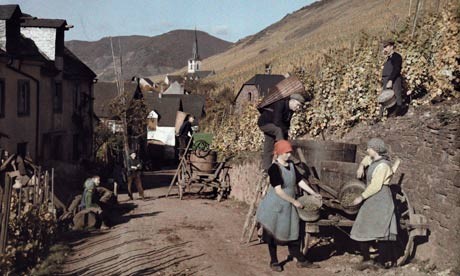30/04/2012
Peasant Revolt 1930
http://www.guardian.co.uk/books/2012/mar/04/small-circus-hans-fallada-review
A Small Circus by Hans Fallada – review
Hans Fallada's 1931 chaotic comedy of provincial Germany unwittingly reveals a country ripe for Nazism

German fruit farmers, late 1920s. Hans Fallada's novel turns on a farmers' demonstration and its consequences for the local community. Photograph: Wilhelm Tobien/National Geographic/Corbis
The German novelist Hans Fallada is one of the more unlikely success stories of recent years. Born Rudolf Ditzen in 1893, Fallada (a pen-name based on a composite of characters from the Brothers Grimm) was lucky even to make it beyond adolescence, surviving a traffic accident, serious illness and repeated suicide attempts before he was out of his teens. During the 1920s, he spent several periods in prison on account of his morphine addiction; even when the success of his novel Little Man, What Now? finally brought him financial stability in 1932, the rise of Nazism heralded new anxieties. Over the course of the 30s, Fallada was in turns alienated and appropriated by the Nazis, and the embittered novelist, increasingly driven by alcohol, spent the years leading up to his death in 1947 in a variety of institutions (after allegedly attempting to kill his wife in 1944). Despite his considerable success, Fallada's life ended in sorry failure.
Yet in the last months of his life Fallada had completed the manuscript that would ensure his eventual renaissance. Published for the first time in English in 2009, Alone in Berlin tells the true story of an ordinary Berlin couple and their acts of resistance to the Nazi authorities. The astonishing international success of Michael Hofmann 's English translation has been well documented. Can it be repeated with one of Fallada's earlier books?
Originally published in 1931 as Farmers, Functionaries and Fireworks, A Small Circus (the author's preferred title) was Fallada's first novel of note, earning praise from figures as disparate as Hermann Hesse, Robert Musil and Joseph Goebbels. It is, in many ways, more representative of Fallada's oeuvre than Alone in Berlin, since it vividly depicts the provincial politics and internecine squabbling of the Weimar republic (the subject of much of his best work). Fallada describes the tensions in the small north German town of Altholm between farmers, journalists, businessmen and politicians, with the action turning around a farmers' demonstration and its consequences for the local community. If it lacks the intensity and focus of Fallada's last book, this very lack of focus is an accurate representation of the fissiparous energy of the Weimar years: a novel without a hero for an age without a hero.
The gallery of small-town characters is essentially comic, from the provincial journalists dreaming of life in the big city to the self-important local functionaries and civil servants. The Weimar republic certainly offers rich material for comedy, and Fallada vividly captures the ineptitude of its political system: the contested flag borne proudly by the farmers at the head of their demonstration, and incompetently confiscated by the local police, provides an appropriate emblem of both the pettiness and the incipient nationalism of these republican years. Indeed, the novel is full of metonyms for the chaos of the period, from the "small circus" of the title to the peasants' revolt of the farmers' movement. As Fallada notes in the original foreword: "My small town stands for a thousand others."
The comedy of the 20s, however, would become the tragedy of the 30s, and it is impossible to read the novel now without feeling the weight of subsequent events. The appendix to the English edition, contrasting election results from 1928 and 1930, demonstrates the startling gains made by Hitler in this period, and bears out the farmers' claim that the "Reds and the Nazis are given their head, we farmers are placed under emergency law". The mayor's closing assurances that it will all be better if they move to a new town ring necessarily hollow: it is precisely such provincial bickering that allowed the Nazis to engineer their dramatic rise to power.
Stylistically, the novel is typical of the so-called "new sobriety" of the period. The story is driven by dialogue, and Fallada's language is accordingly colloquial and direct; Hofmann responds to the demotic ebullience of the German with his usual flair (despite occasional anachronisms such as "nuts" and "no probs"). Given the overwhelming concentration on the city in modernist writing of the 20s and 30s, it is refreshing to encounter a small-town perspective, and indeed this may be the novel's most enduring contribution. Fallada's own experiences as a regional journalist in north Germany underlie the action, and it is this sense of realism, combined with an ear for dialogue and an acute understanding of human frailty, that make the novel such an authentic portrayal of an imploding era. Kurt Tucholsky 's judgment of 1931 remains the most accurate: "It is no great work of art, but it is so terribly genuine that it's frightening."
18:34 Publié dans Actualité, Bibliographie, Histoire, Textes sur Hans Fallada | Lien permanent | Commentaires (0)




Les commentaires sont fermés.